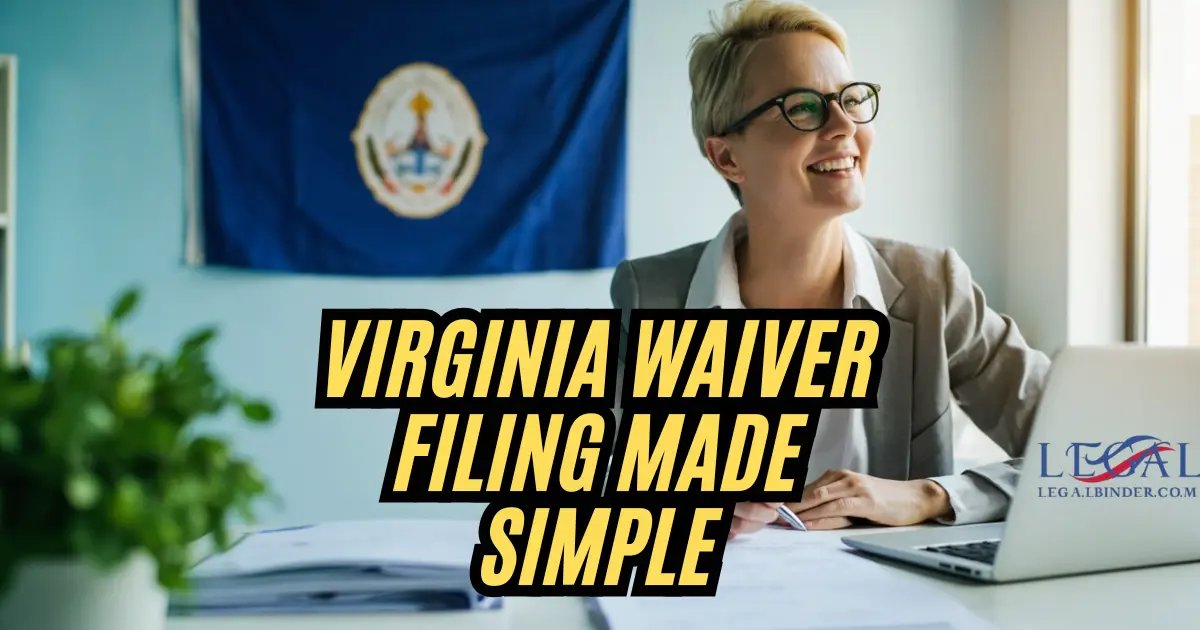Virginia Waiver Filing — If you cannot afford court fees or need to request fee relief in Virginia, this simple, state-focused guide shows exactly how to prepare, submit, and follow up on a waiver request. Read on to learn Virginia-specific eligibility rules, the forms you’ll need, and step-by-step filing instructions so your waiver submission is complete and timely.
This article is tailored to Virginia procedures, referencing official Virginia Judicial Branch resources and state portals. Gather your documents before you begin and use the links below to download current forms.
Quick Overview / What this Virginia Waiver Filing covers
In Virginia, a waiver typically means asking the court to excuse payment of filing fees, transcript fees, or other court costs due to financial hardship. Waivers can also apply to appellate fees or bonds and sometimes to agency or licensing fees where state law permits.
Common waiver types in Virginia include:
- Waiver of initial court filing fees (civil, family, probate).
- Requests to proceed in forma pauperis for appeals or trial proceedings.
- Waiver or reduction of transcript, copying, or certification fees.
State-specific Requirements (Virginia Waiver Filing)
The Virginia Judicial System evaluates waiver requests under state court rules and local clerk procedures. The court will examine household income, expenses, assets, and whether you receive public benefits when deciding whether to grant fee relief.
Key Virginia resources and agencies to know:
Residency and jurisdiction: file the waiver in the Virginia county or circuit court where the case is pending. Courts in Virginia apply local clerks’ filing procedures—check county clerk instructions for electronic filing or in-person drop-off options.
Eligibility basics for Virginia Waiver Filing
- Receiving means-tested benefits (e.g., SNAP, Medicaid) is strong evidence of indigency in Virginia.
- Low income relative to household size and essential expenses (rent, medical) may qualify you for a waiver.
- Prisoners and pro se litigants have specific in forma pauperis procedures under Virginia law for appeals and filings.
Step-by-step How to Complete & Submit Virginia Waiver Filing
Follow these steps for a correct Virginia Waiver Filing that minimizes the chance of delay or denial.
- Download the correct form. Start at the Virginia Judicial System forms page and find the indigency, in forma pauperis, or fee-waiver form for your court level.
- Collect supporting documentation. Prepare pay stubs, benefit award letters (Medicaid/SNAP), unemployment statements, bank statements, and government ID.
- Complete the affidavit thoroughly. Enter the court name, case number, household members, income sources, monthly expenses, and any special circumstances (medical debts, child care).
- Sign and swear as required. Most Virginia forms require a sworn statement under penalty of perjury—follow signature and notarization instructions on the form.
- Attach evidence. Include photocopies of benefit letters, pay stubs, or bank statements to corroborate your claims.
- File with the clerk. Submit the completed form and attachments to the county or circuit court clerk in person, by mail, or via the court’s electronic filing system if available.
- Keep a stamped copy and follow up. Request a filed-stamped copy for your records and check with the clerk about any scheduled hearings or additional requests from the judge.
Virginia courts commonly expect the following with a waiver application:
- Indigency affidavit or in forma pauperis form (download from VACourts Forms).
- Proof of public benefits: Medicaid, SNAP, TANF, or Social Security statements.
- Recent pay stubs (last 1–2 months) or employer verification of income.
- Bank statements covering the last 1–3 months, if requested.
- Virginia ID (driver’s license or state ID) and copies of case pleadings or appeal notices.
Processing Time, Fees and Deadlines Virginia Waiver Filing
Filing the waiver form is generally free. Processing time varies by court level and county.
- Processing time: Clerks usually forward forms to the judge within days; decisions can take from a few days to several weeks depending on caseload.
- Fees: No charge to file the waiver itself. If denied, you remain responsible for filing fees, transcript costs, and any bonds.
- Deadlines: File the waiver when you file your original pleading or before the appeal deadline if seeking appellate relief to avoid dismissal or forfeiture.
Common Mistakes to Avoid Virginia Waiver Filing
- Using an outdated form—always download the latest version from VACourts.
- Failing to attach supporting evidence like benefit letters or pay stubs.
- Leaving required fields blank or providing inconsistent income data.
- Not filing in the correct Virginia court or omitting the case number.
- Not retaining a stamped copy of the filed waiver for your records.
Download authoritative Virginia forms and instructions at:
FAQs
A: Use the indigency affidavit or in forma pauperis form available on the Virginia Judicial System forms page. Confirm county variations with your local clerk.
Q: Will my waiver be granted automatically?
A: No. Virginia judges review the affidavit and supporting documents and may deny the request if you are reasonably able to pay fees.
Q: Can I request waiver of appellate fees in Virginia?
A: Yes. File the in forma pauperis or appellate indigency request before the appeal deadline to preserve your appellate rights.
Q: What if my waiver is denied?
A: If denied, you must pay the required fees or present additional evidence. Consider seeking legal aid or consulting an attorney for next steps.
A: Contact county clerk self-help centers, legal aid organizations in Virginia, or law school clinics like William & Mary for guidance and support.
Conclusion & Call to Action
Completing a waiver Virginia filing correctly increases your chance of approval and prevents costly delays. Start by downloading the correct indigency or in forma pauperis form from the Virginia Judicial System, gather proof of income or public benefits, and file with the county clerk promptly.
For official forms and county contacts visit the Virginia Judicial System forms page or the Virginia.gov portal. For related resources and templates, visit USAlegalBinder.com or consult a qualified Virginia attorney for case-specific advice.
